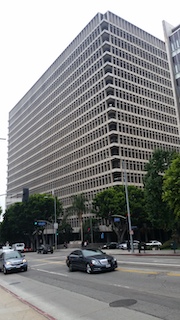Among those in prison sentenced for murder, Senate Bill 1437 and its resentencing provisions are discussed enough that such prisoners and their families call our office requesting further information on this new law.
As part of our discussion we feel obligated to advise many that counsel is appointed for anyone who first makes a prima facie showing of entitlement to relief under the new law. In other words, the prisoner himself need only fill out a form that asks him or her to sign under penalty of perjury that he or she:
When we explain each of these requirements to establish a prima facie case, the caller usually has lots of questions because these requirements involve legal definitions and necessarily involve discussions of what is a major participant (see People v. Banks (2015) 61 Cal.4th 788) and what is acting with reckless indifference to human life (see People v. Clark (2016) 63 Cal.4th 522).
 Clara Shortridge Foltz CCB Courthouse
Clara Shortridge Foltz CCB Courthouse
Such a discussion often leads to a point wherein the family member advises that he or she does not know if the jury found reckless indifference to human life or whether the incarcerated person was found by the jury to be a major participant, but they must first tell us that their loved one was not the actual killer and was not found to be an aider or abettor.
This conversation often does not lead to any definitive answers, but we tell the caller that the incarcerated person should not just lie on the form seeking resentencing under Senate Bill 1437.
However, the imprisoned person may reason, “what if I am wrong? What are they going to do? Throw me in prison? I am already here. What more can they do except tell me no?” Conversely, if they tell me “Yes,” I get free legal services and maybe I will be released from prison. “I have nothing to lose!”
That reasoning apparently led Anthony Lyle Tarkington, who was convicted of second-degree murder in the downtown Los Angeles Clara Shortridge Foltz criminal courts building.
The underlying facts were that on June 22, 1996, Tarkington and Donald Fitzpatrick got into a fistfight as they were waiting for free coffee and donuts in downtown Los Angeles in the Skid Row section, where both men were living. Tarkington stabbed Fitzpatrick in the shoulder and the stomach and Fitzpatrick died. No one else was involved in the crime.
A jury found Tarkington guilty of second-degree murder and found true that he personally used a deadly and dangerous weapon, a knife, in committing the murder. Under the Three Strikes Law, the judge sentenced Tarkington to 46 years to life in prison.
On January 28, 2019, after passage of SB 1437, Tarkington filled out a form petition for resentencing under Penal Code § 1170.95. He may or may not have been paying attention to what he submitted, however, he represented to the trial court for resentencing that he was prosecuted on felony murder theory or under the natural and probable consequences doctrine. This was not true. He also initialed a box on the form representing that he was not the actual killer. This also was not true. He was prosecuted on a theory that is not affected by SB 1437 or the changes to the felony murder rule.
The trial court, in receiving his form petition, denied it without appointing counsel for him.
Tarkington then appealed to the Second Appellate District Court of Appeal in downtown Los Angeles, arguing that the trial court erred by not appointing him counsel first.
The Second Appellate District affirmed the trial court, explaining that summary denial of such a writ, before appointing counsel is proper. People v. Edwards (2020) 48 Cal.App.5th 666, 674; People v. Verdugo (2020) 44 Cal.App.5th 320, 326.
We bring this rather fundamental case to the reader’s attention to hopefully help one avoid the error that Mr. Tarkington made.
The citation for the Second Appellate District Court ruling discussed above is People v. Anthony Lyle Tarkington (2d App. Dist., 2020) 49 Cal. App. 5th 892, 263 Cal. Rptr. 3d 469.
For more information about SB 1437 procedures, please click on the following articles:
 Clara Shortridge Foltz CCB Courthouse
Clara Shortridge Foltz CCB Courthouse